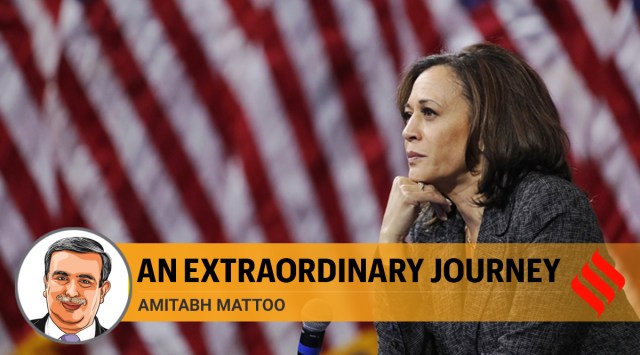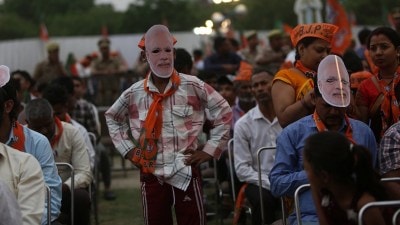- India
- International
The rise of Kamala Harris is as much an Indian story as it is a part of the American dream
While it was prudent (and opportunistic) for New Delhi to have invested in the narcissism of Trump, it may also be a moment to revisit and reflect on the idea that only the present incumbent can deliver on the promise of bilateral relations.
 Democratic presidential candidate Sen. Kamala Harris, D-Calif., listens during a gun safety forum in Las Vegas. (AP Photo: John Locher, File)
Democratic presidential candidate Sen. Kamala Harris, D-Calif., listens during a gun safety forum in Las Vegas. (AP Photo: John Locher, File)The life of the presumptive Democratic vice presidential candidate, Kamala Devi Harris, is a compelling story of the resilience of the human spirit; it is as much an Indian story as it is a part of the so-called American dream. Harris’s political ideals — as she campaigns to become the first woman, the first person of colour, and the first person with an Indian heritage to become Vice President of the US — are tied to the very soul of the idea of India and the way we were, much before America was even born as a nation.
Just imagine this. Circa 1958, a teenaged Tamil Brahmin girl, daughter of a middle-class civil servant posted in Delhi, embarks on an extraordinary adventure. At a time when Indian girls rarely went abroad for higher education, and rarely pursued research in the STEM areas, Shyamala Gopalan, not quite 20, moves to the University of California, Berkeley, to pursue her research and scientific career in cancer research. Kamala Harris is the daughter of this extraordinary woman, who lives with two ambitions: To bring up two daughters well and find a cure for cancer.
Shyamala and her husband, Donald Harris, a Jamaican economist, are embraced by the black community in California and this becomes part of her extended family. As Senator Harris points out in her autobiography, “These were my mother’s people. In a country where she had no family; they were her family –- and she was theirs… My mother understood very well that she was raising two black daughters. She knew her adopted homeland would see [us]… as black girls, and she was determined to make sure we would grow into confident, proud black women.” Shyamala, although soon divorced, remained a dedicated civil rights activist.
Shyamala’s fight for inclusion, justice, fair play, the role of civil resistance and respect for the dignity of human lives in it, with a sense of moderation and compassion, are values that most Indians would identify with instantly, even today. These were also the beliefs that propelled India’s movement for independence that Kamala Harris’s Indian grandparents were advocates for and identified with strongly.
In this sense and more, in Senator Harris’s success lies the advancement of India’s ideals, much beyond small diplomatic sticking points and narrow nit picking. As the Connecticut-based academic, of Indian origin, Manisha Sinha, wrote recently: “[Biden’s] decision to pick Kamala Harris as his running mate seems like a personal gift to me.”

While it is still early to say if the Biden-Harris ticket will capture the imagination of the American electorate, together they could offer the world new hope, and particularly bilateral India-US relations a real chance at stability and predictability beyond the kabhi khushi, kabhie gham of the Trump years.
Quite clearly, if the elections were held today, the Biden-Harris team would win a landslide. And as my favourite US pollster, Nate Silver, points out, they could win over “traditional swing states such as Florida and Pennsylvania but potentially adding new states such as Georgia and Texas to the Democratic coalition” as well. As Silver concedes, however, it is way too soon to count Trump out. But, for sure, Harris’s inclusion adds a new panache to the Biden campaign, and he has given his VP nominee greater weight by suggesting that he would be a transition president — making way for Harris after four years were he to be elected to the White House.
While it was prudent (and opportunistic) for New Delhi to have invested in the narcissism of Trump, it may also be a moment to revisit and reflect on the idea that only the present incumbent can deliver on the promise of bilateral relations. Even the proposition, almost accepted as an axiom in some corridors of power, that only Republicans get India right because of the unemotional surgical precision by which they advance American interests, may need further reflection. While, in the past, wooly-headed liberals amongst the Democrats expressed concern about human rights, nonproliferation and social inclusion in a fashion that undermined diplomatic relations, today the mainstream of the Democratic Party understands the importance of India. In contrast, the audit of the last four years has been disappointing. For all the highs of the extravaganzas at Motera or Houston, the Trump administration’s policies have been premised on America First in a manner in which our immediate neighbourhood, especially Afghanistan, has been unsettled, and also has had a deep impact on skilled unemployment of Indian workers in the US under HIB visas.
Explained: Who is Kamala Harris and what does her pick signify?
The main contours of the foreign policy of a potential Biden–Harris administration are far from clear. But it is safe to say that the Democrats are equally concerned about China, are tough on terrorism and have deep suspicions about foreign countries undermining the democratic process of elections in the US. On issues that impact India, it is short-sighted and counter productive to view the senator’s signaling on Article 370 or CAA as anything more than just that: Symbolic signaling. In contrast, on the issues that matter most to professional Indians, Harris has been remarkably positive. Harris wrote against revoking the “right of spouses of H-1B visa holders to seek employment”. Similarly, Harris has called for the elimination of country quotas for getting green cards. Indians are deeply impacted by both issues.
While not as gifted a writer as Barack Obama, Kamala Harris’s autobiography, The Truths We Hold: An American Journey reflects the spirit of Obama’s “The Audacity of Hope”. And in Kamala Harris’s narrative we find a unifying bond between India and the US; Shyamala Gopalan, and all that she stood for, reflects the essence of India and the US. Not surprisingly, Harris’s book is dedicated to her: “Mommy you are the star of the book because you were the reason for everything … it is my sincerest hope that this book will help those who never met you understand the kind of person you were. What it meant to be Shyamala. And what it means to be her daughter.”
Also read | From policy to family: How the Kamala Harris nomination is relevant to India
Ironically, the greatest strengths of Kamala Harris are also her weaknesses. She is not leftwing enough to drive the activism of a Bernie Sanders, nor is she an establishment icon like Susan Rice to be a Washington DC insider. Her life has been one of doing the right thing, in moderation. It is a life all Indians could embrace and must celebrate enthusiastically.
This article first appeared in the print edition on August 14, 2020 under the title ‘An extraordinary journey’. The writer is professor of international relations at JNU.
EXPRESS OPINION
More Explained
Apr 25: Latest News
- 01
- 02
- 03
- 04
- 05










































